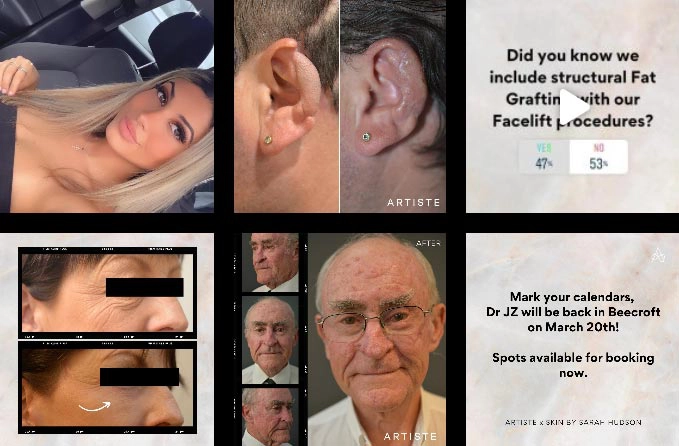5 Possible Questions About Facelift Surgery Answered
Model featured in photography
If you’re exploring options to address visible signs of ageing through cosmetic surgery, a facelift is one of several available choices. In this article, we provide general information addressing five common questions about facelift surgery. It’s important to consult with your GP and surgeon to assess whether a facelift is suitable for you.
What is a facelift, and how does it work?
A facelift is a surgical procedure that works by tightening the skin and underlying facial and neck muscles. During the procedure, a surgeon makes carefully planned incisions around the ears and in the hairline to minimise visible scarring. The skin is then lifted, excess fat and skin are removed, and the remaining skin is tightened and repositioned.
Am I a good candidate for a facelift?
You may be a good candidate for a facelift if you are in overall good health and have realistic expectations about the results of the procedure. Typically, candidates are individuals over the age of 40 who are experiencing noticeable signs of ageing, such as wrinkles, loose skin, and a loss of facial volume. It’s essential to consult with a qualified surgeon to discuss your specific situation and determine the best approach for your aesthetic goals.
How long does it take to recover from a facelift?
The recovery time after a facelift can vary from person to person, but it generally takes about three weeks to heal. During the first week, patients may experience swelling, bruising, and discomfort, which typically subside within one to two weeks. It’s important to avoid strenuous exercise for several weeks post-surgery. Always follow your surgeon’s specific aftercare instructions for the best recovery experience.
How long does the result of a facelift last?
The results of a facelift can last anywhere from 5 to 12 years, depending on several factors, including age, skin type, lifestyle, and the specific technique used during the procedure. While a facelift can significantly make changes in your appearance, it does not halt the natural ageing process.
Is a facelift safe?
Facelift surgery can be considered generally safe when performed by a qualified and experienced plastic surgeon. However, as with any surgical procedure, it carries potential risks and complications, which may include infection, bleeding, scarring, and anaesthesia-related issues. It’s essential to discuss these risks with your plastic surgeon and to follow all recommended pre- and post-operative care instructions.
Disclaimer: At Artiste Plastic Surgery, our Plastic Surgeons led by Dr Jack Zoumaras have been trained to the highest possible degree. All surgery has risks and it is always advised to get a second opinion. Risks are very real and we cannot guarantee any result. Results are illustrated as a guide only. All risks are managed and any need for revision surgery or complications (1-5%) can be managed by our specialist plastic surgeons.
Any statements on how you will feel is based on Level V Evidence:
Level V: How you will feel after plastic surgery varies between individuals, depending on psychological and physical factors. Our internal research is based on how patients in our practice feel after surgery.
The blogs are not a substitute for a medical consultation and do not form as part of the doctor to patient relationship.
SHARE THIS ARTICLE
Feb02
Planning Facial Surgery in Bondi Junction? What You Should Know
Disclaimer: At Artiste Plastic Surgery, our Plastic Surgeons led by Dr Jack Zoumaras have been trained to the highest possible degree. All surgery has risks and it is always advised ...
Feb02
Why Experience Matters: What to Look for in a Facial Plastic Surgeon
Disclaimer: At Artiste Plastic Surgery, our Plastic Surgeons led by Dr Jack Zoumaras have been trained to the highest possible degree. All surgery has risks and it is always advised ...
ABOUT ARTISTE
Artiste Plastic Surgery is an Award Winning Specialist Plastic Surgery practice led by internationally trained Dr. Jack Zoumaras, Plastic Surgeon and Peer Reviewed Face Surgeon
Artiste offers the latest Cosmetic Surgical Procedures of the Face, Breast and Body, inspired from leading centres around the world.
STAY IN THE LOOP
Enter your email address below to receive updates on new articles and VIP access to promotions and special offers.
FOLLOW US ON INSTAGRAM
